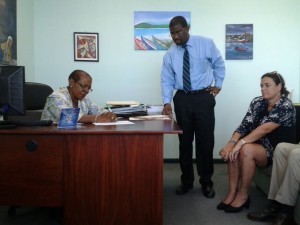On Wednesday, the 21st of January 2015, Professor Corinne Hofman of Leiden University and the Ministry of Culture and the Grenada National Trust signed an MOU, agreeing scientific and cultural cooperation as part of the ?Nexus 1492 ERC-synergy? project.
Nexus 1492 ERC-synergy objectives
The ambition of NEXUS 1492 is to rewrite a crucial and neglected chapter in global history by focusing on transformations of indigenous, Amerindian cultures and societies across the historical divide of 1492. It investigates the impacts of colonial encounters in the Caribbean, the nexus of the first interactions between the New and the Old World.
Objective 1: Provide a new perspective on the first encounters between the New World and the Old World by focusing on the histories and legacies of the indigenous Caribbean across the historical divide and by addressing the complex intercultural interactions over the ensuing centuries.
Objective 2: Raise awareness of Caribbean histories and legacies, striving for practical outcomes in future heritage management efforts with implications for local communities, island nations, the pan-Caribbean region, and globally.
The first objective will be addressed by creating (1) a multi-scalar temporal (AD 1000-1800) and regional (pan-Caribbean) approach to Amerindian archaeology, specifically addressing the historical divide and thereby bridging the gap between pre-colonial and colonial histories, (2) a trans-disciplinary research design targeting the intercultural nexus of colonial encounters and Amerindian-African-European dynamics, and (3) a systematic approach to apply and develop cutting-edge multi-disciplinary methods and techniques.
The second objective will be reinforced by the involvement of Caribbean scholars and local communities in the proposed research agenda, enhancing international cooperation and a sense of ownership. Furthermore, a joint heritage agenda will be designed to mitigate loss of indigenous cultural remains caused by natural and human forces, and to raise historical awareness on local, regional, and global scales.
NEXUS 1492 addresses two main research questions:
- What are the immediate and lasting effects of the colonial encounters on indigenous Caribbean cultures and societies and what were the intercultural dynamics that took place during the colonisation processes?
- How can the study of indigenous Caribbean histories contribute to a more sophisticated awareness and to the design of a heritage programme that will speak to multiple and perhaps competing stakeholders at local, regional, pan-regional, and global scales?
 Professor Hofman was also invited to give a lecture during a session at the Grenada National Museum on the Nexus project and its significance for Grenada.
Professor Hofman was also invited to give a lecture during a session at the Grenada National Museum on the Nexus project and its significance for Grenada.
During late March and Early April 2015, Grenada Museum Curator, Angus Martin will visit Leiden University to progress project.

